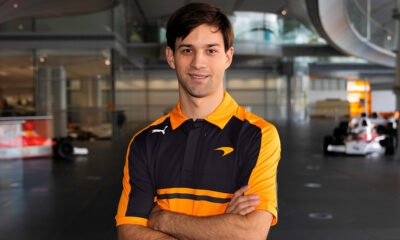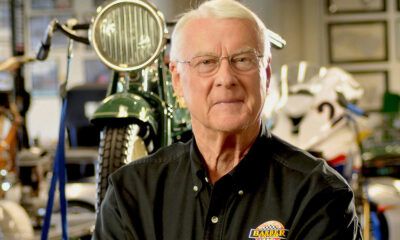
Photo: Courtesy, Mazda Raceway Laguna Seca
The name Denise McCluggage resonates with anyone raised on American motor racing from the 1950s forward. She was such a multi-dimensional force that it is difficult, and wholly unnecessary, to rank her accomplishments as to their importance to sports car racing.
She passed away late Wednesday at the age of 88.
Denise will be remembered as one of the most successful pioneer woman racers of the period. Moving from a Jaguar XK140 in 1956, to a Porsche 550 for the next two seasons, and then an Osca in 1959, she was a regular on the scene in the Northeast and Midwest.
Soon she was no stranger on the international stage either. Often co-driving with other prominent women of the day such as Ruth Levy and Isabel Haskell, McCluggage raced in 11 World Endurance Championship events.
Highlights included a GT class win with a Ferrari at the Sebring 12 Hours of 1961, and a second in class at Sebring in her final major race there in 1967.
Throughout this time she brought a unique sensibility to the journalistic coverage of the sport. All too often, coverage of motor racing was of the dry “he was fast, he led, he won” style.
Denise came from a broad New York literary background and was already writing on many other subjects, including another sport that she loved—skiing.
McCluggage introduced a new ethos to motor sport coverage, imbued in large part by her close friendships with many of the participants. This also informed her excellent photography. Denise’s portraits of drivers and action during that period are some of the most poignant in existence.
Denise was also a keen businesswoman. She was the creative force behind Competition Press which became Autoweek, one of the most significant publications in the field. Even after leaving the helm of the magazine, she certainly never retired.
Denise continued to write extensively, including several books, countless articles and many commentaries appearing on websites in recent years. She was a much sought after speaker at car events and lectures, where she was invariably entertaining, informative, and enthralling.
Perhaps above it all, Ms. McCluggage spent the last few decades as a mentor.
She guided and encouraged several young women who were new to the sport. Denise was always there to help with projects related to the history of the sport.
It was in that capacity that I first met her. Beginning in the mid-1990s when I embarked on my literary journey into the field, she was one of my first champions.
Denise provided me with ample tidbits about her period in the sport and introduced me to many other people. Given her stature in the sport she could have been reticent to open up or she could have been intimidating.
Denise was neither. She was always there to guide and to help. Meeting with her or just listening to her stories was worth every minute. Those times will be sorely missed.
























